Secretary's review
The past year has been a successful one for Treasury, both in our core business of providing advice and assistance to the Government and in internal corporate developments.
Neither the Department's nor the Portfolio's roles and responsibilities changed materially during the year and activity was intensive on most fronts.
There was, of course, a clear focus on implementation of The New Tax System, minor elements of which commenced throughout the year, with the main components coming into effect at year's end. While it is yet early days, the implementation appears to have been a notable success. This owes much to outstanding work of the GST Startup Assistance Office (which supervised an unprecedented education and assistance campaign), the Australian Taxation Office and the Australian Competition and Consumer Commission.
Work continued with the implementation of major reforms to business taxation and this will continue as a prime focus of tax policy attention in the year ahead.
Other elements of structural reform were also progressed, notably in financial market regulation and corporate law and within many of the basic infrastructure industries; all of these issues are ongoing but progress in structural reform in recent years has seen Australia's productivity performance improve substantially, leading to our receiving special mention in the OECD's study of `new economies'.
Certainly, our economic performance in 1999-2000 was again impressive, yielding strong growth and declining unemployment, without generating significant inflationary pressures; while our external deficit remained high, the fact that it did not deteriorate to the extent of previous strong growth episodes is indicative of new dynamics within the economy. A strong fiscal position - one of the strongest in the world - no doubt also played a role.
Work was commenced on a study of the implications of globalisation - in all its guises - for economic policy and the outcome of that work will help guide our policy-advising priorities in the year ahead.
The Treasury Management Model, developed over the preceding years, became fully operational in 1999-2000, with staff taking increasing responsibility for final delivery of analytical work and policy advice and Senior Executive Staff focusing on strategic issues, including staff development. All staff participated in two full appraisal rounds and the first universal career development round. Staff have accepted and been involved in the development and implementation of these processes. It was pleasing to see these improvements incorporated into our second generation Certified Agreement which was certified on 3September1999 and covers the ensuing three years.
Other departmental efficiency improvements were progressed during the year, notably in financial management, human resources and communications. An information and knowledge management project, still in its infancy, has the potential to dramatically improve our service provision and lower its cost - an apposite example of the application of information technology to yield `new economy' benefits.
In all of these endeavours, Treasury staff have performed with distinction and good humour and, on behalf of the Treasury Executive, I record my appreciation of their efforts.
Ted Evans
Secretary to the Treasury
Corporate statement
Treasury's mission
Treasury's mission is to improve the wellbeing of the Australian people by providing sound and timely advice to the Government, based on objective and thorough analysis of options, and by assisting Treasury Ministers in the administration of their responsibilities and the implementation of government decisions.
Policy outcomes
In carrying out its mission, Treasury has regard to the following policy outcomes:
§ sound macroeconomic environment;
§ effective government spending and taxation arrangements; and
§ well functioning markets.
Sound macroeconomic environment
Economic Group provides advice on economic conditions and the outlook; advice on the implications of economic developments for macroeconomic policy; advice on fiscal and monetary policy; and advice on labour market issues.
The group also provides strategic advice on international economic policy issues; advances Australia's interests through the international financial institutions and in international fora; advances Australia's interests in countries requiring technical and financial assistance; and monitors and analyses economic developments in key global economies.
Effective government spending and taxation arrangements
Budget Group provides advice to government ministers and other services in support of `effective government spending and taxation arrangements'. The focus of the Group is on the direct activities of the Government, its spending programs, industry assistance, funding of other levels of government and the use of taxation powers. The Group advises in particular on the Commonwealth budget and taxation policies.
Well functioning markets
Markets Group provides adv
ice on policy processes and reforms that promote a secure financial system and sound corporate practices, remove impediments to competition in product and service markets and safeguard the public interest in matters such as consumer protection and foreign investment.
Markets Group's advice and other activities are directed toward maintaining and improving well functioning markets, where investors and consumers have confidence and certainty about the regulatory framework and are able to make decisions that are well informed and free of market distortions and impediments.
Corporate strategies
Treasury seeks to carry out its mission by:
§ maintaining effective liaison with portfolio ministers and their offices and with other government departments;
§ maintaining extensive contact with other levels of government, research institutes and interest groups;
§ giving priority in operational arrangements to identifying important emerging issues, undertaking longer-term research and ensuring regular internal discussion of key policy issues;
§ creating an environment for better informed public debate by explaining the Government's policy settings and views on economic conditions;
§ fostering a consultative management culture within the Department;
§ efficiently organising departmental resources to provide high quality, relevant and timely advice;
§ promoting continuous improvement, including staff management, development and skills enhancement; and
§ internal and external review and evaluation of strategies, processes and outcomes.
Table 1: Treasury financial and staffing resources summary
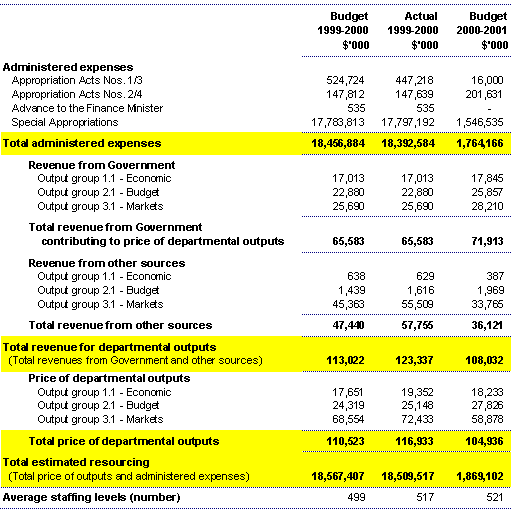
Note 1: Variations in the price of departmental outputs for Budget estimates in 2000-01 are attributed to revised internal allocations.
Note 2: Prior year comparative data are not available due to the change in the output framework.
2000-01 priorities
Key priorities for 2000-01 are:
§ assist the Government implement taxation reforms, in particular GST and business tax;
§ deliver the Commonwealth budget and mid year economic and fiscal outlook;
§ formulation of rigorous economic forecasts and macroeconomic policy advice;
§ develop strategies and initiatives for advancing Australia's interests in international fora;
§ contribute to whole-of-government programs relating to regional and rural Australia;
§ provide policy advice on and promote the benefits of ongoing structural reform;
§ provide advice on developments in the financial sector and on the Government's program to promote Australia as an international financial centre;
§ complete the implementation of the Corporate Law Economic Reform Program 6 (CLERP 6);
§ implement key government commitments toward a fairer, more informed and safer market for consumers especially in relation to e-commerce;
§ improve financial management, human resource and information systems and processes;
§ improve internal and external communication; and
§ manage the refurbishment of the Treasury building and the subsequent relocation of Treasury personnel and operations.
Treasury people values
Treasury people management principles
§ There will be open, two-way communication at all levels.
§ Accountabilities will be clearly defined.
§ Remuneration will be based on work performance and determined by fair and transparent processes.
§ Staff will be assisted in achieving appropriate work and private life balance.
Treasury people will
§ strive for excellence.
§ value teamwork, consultation and sharing ideas.
§ value diversity among our people.
§ treat everyone with respect.
§ exhibit honesty in all our dealings.
§ treat colleagues with fairness.
Chart 1: Treasury portfolio outcome structure (as at 30 June 2000)
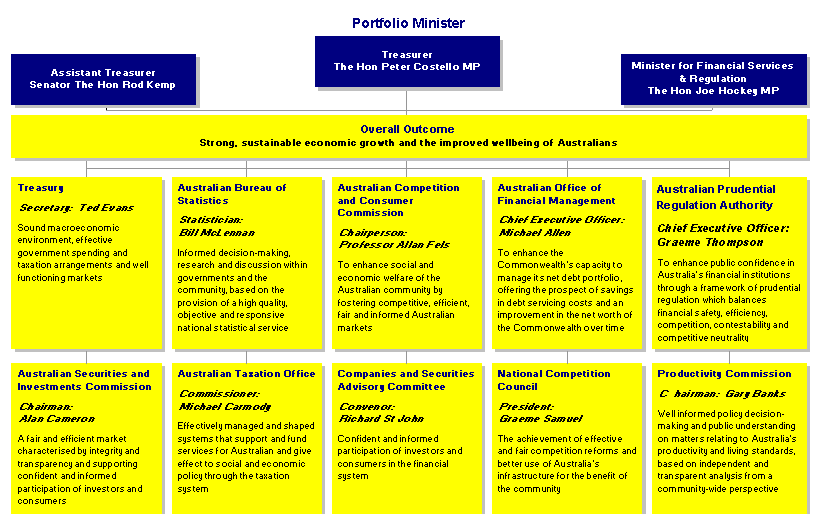
Chart 2: Portfolio output structure (as at 30 June 2000)
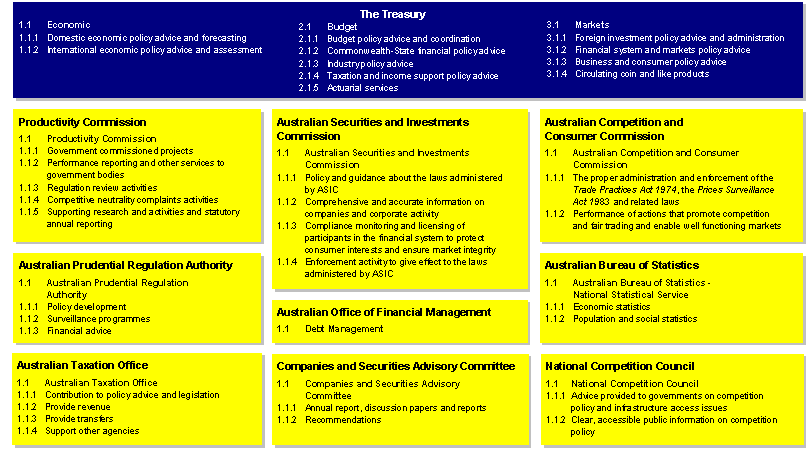
Chart 3: Transition from subprogram to outcome/output structure
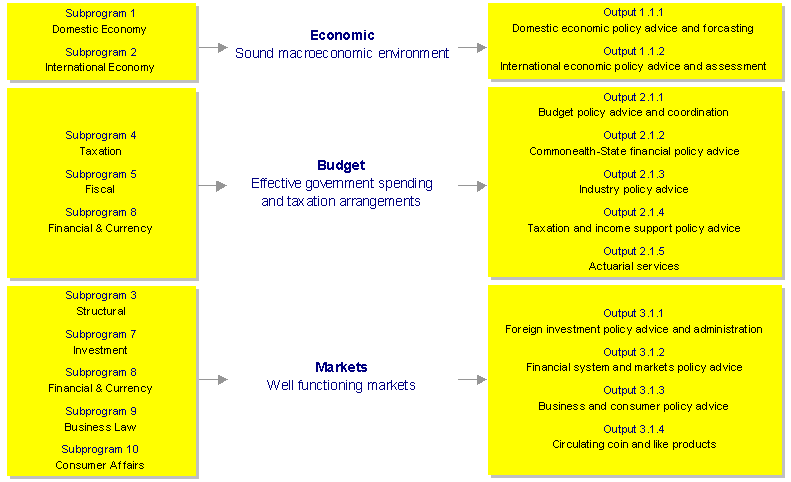
Subprogram 6 - Debt Management moved to the separate reporting agency Australian Office of Financial Management
Subprogram 8 - Financial and Currency was split between Budget and Markets output group
Subprogram 11 - Corporate Direction is an input and therefore not shown in the new structure
Chart 4: Treasury output structure (as at 30 June 2000)
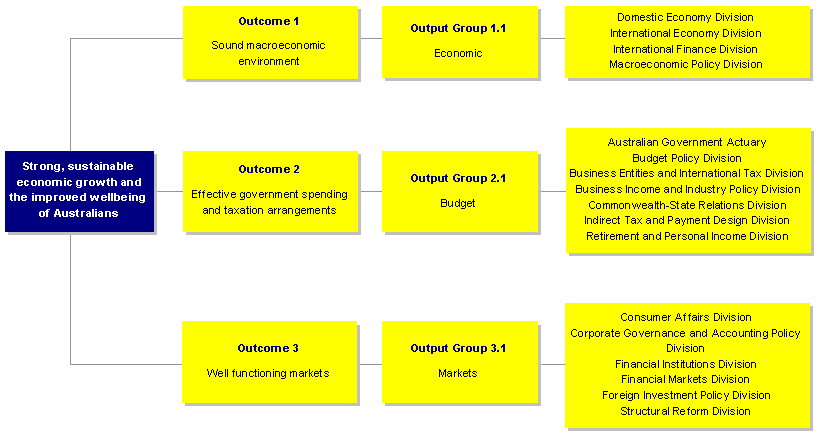
Chart 5: Treasury top management structure (as at 30 June 2000)
|
|
|
|
|
|
|
|
|
|
|
|
SECRETARY
Ted Evans
|
| |
|
|
|
|
|
|
|
ECONOMIC GROUP
Executive Director
Dr Ken Henry
|
|
BUDGET GROUP
Executive Director
Greg Smith
|
|
MARKETS GROUP
Executive Director
Gary Potts
|
|
CORPORATE SERVICES
|
|
Macroeconomic Policy Division
General Manager
Dr James Horne
International Finance Division
General Manager
Karen Spindler
Specialist Advisers
Terry O'Brien
Chris Legg
International Economy Division
General Manager
Peta Furnell
International
Chief Adviser
Gary Johnston
Domestic Economy Division
General Manager
Dr Paul O'Mara (a/g)
Specialist Adviser,
Forecasting
Dr Paul O'Mara
|
|
Washington
Minister-Counsellor
(Economic)
Nigel Ray
London
Counsellor
(Economic)
Melissa Cranfield
Paris
Minister-Counsellor
(Economic)
David Parker
Tokyo
Minister-Counsellor
(Economic)
Brenda Berkeley
Beijing
Minister-Counsellor
(Financial)
Mick Shadwick
Jakarta
Counsellor
(South East Asia Financial)
Mike Waslin
|
|
Australian
Government Actuary
Australian
Government Actuary
Kevin Deeves
Budget Policy Division
General Manager
Dr Paul Grimes
Business Entities and International Tax Division
General Manager
Bruce Paine
Specialist Adviser
Murray Edwards
Business Income and
Industry Policy Division
General Manager
Paul McCullough
Manager Specialist
Richard Wood
|
|
Commonwealth-State
Relations Division
General Manager
Paul Tilley
Indirect Tax and
Payment Design Division
General Manager
Blair Comley
Retirement and
Personal Income Division
General Manager
Roger Brake
Manager Specialist, Retirement and Income Modelling
Phil Gallagher
|
|
Consumer Affairs Division
General Manager
Jan Harris
Corporate Governance and Accounting Policy Division
General Manager
Veronique Ingram
Financial Institutions Division
General Manager
Steve French
Financial Markets Division
General Manger
Michael Willcock
Foreign Investment Policy Division
General Manager
Janine Murphy
Structural Reform Division
General Manager
John Jepsen
Specialist Adviser, Legal
Mark Molloy
|
|
Specialist Adviser, Corporate Strategy
Deidre Gerathy
Corporate Services Division
General Manager
Ian Robinson
Accounting & Financial Management Unit
Chief Financial Officer
David Crossley
Human Resources Unit
Manager
Pamela Henderson
Information Management Unit
Manager
Geoff De La Motte
IT Training and Publications Unit
Manager
Anne Fornasiero
Liaison Unit
Manager
Peter Coan
Contracts, Audit & Facilities Mgt Unit
Manager
Graham Smith
|
|